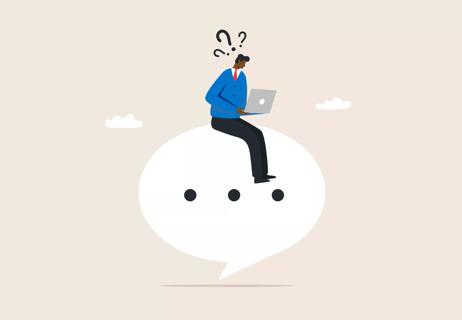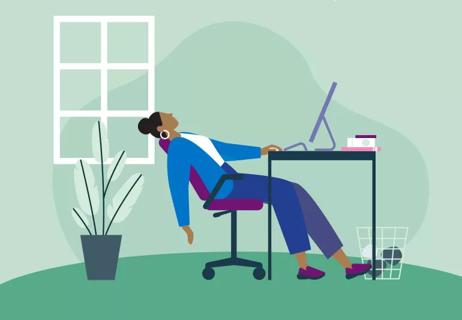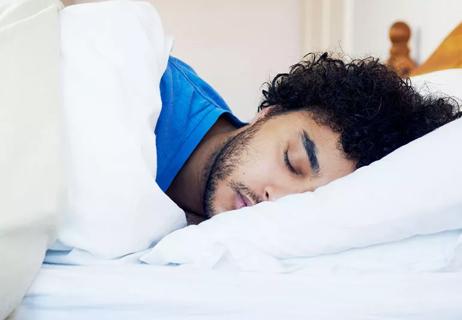A Q&A to help you fight exhaustion and get more sleep

If you’re nodding off a few sentences into reading this article (in broad daylight), you and sleep may need to reexamine your relationship.
Advertisement
Cleveland Clinic is a non-profit academic medical center. Advertising on our site helps support our mission. We do not endorse non-Cleveland Clinic products or services. Policy
“To be healthy, you need to get enough sleep,” says family medicine doctor Matthew Goldman, MD. But getting adequate rest can seem as elusive as winning the lottery.
In this Q&A, Dr. Goldman offers ways to once again dream the impossible dream.
A. The amount of sleep you need varies with age. The National Sleep Foundation recommends that people 18-64 years old get seven to nine hours each night. Adults 65 years and older need seven to eight hours per night.
A. Feeling tired is one of the most common complaints doctors hear about. And fatigue is normal if you had a late night and then feel tired the next day.
But fatigue (either normal or extreme) can become a concern when it affects your health and safety. For example, it’s a problem if you’re likely to doze off in situations where you need to maintain alertness, such as while driving or operating heavy machinery.
So talk to your doctor if fatigue is compromising your safety. Your doctor will also want to know how long you’ve been experiencing symptoms to help determine the cause of your exhaustion.
A. Certain lifestyle choices and habits can affect how rested you feel. Poor sleep hygiene, shift work, jet lag and substance use (including alcohol and narcotics) can all contribute to extreme fatigue.
Advertisement
Certain medications can also affect how tired you feel. These include antihistamines, anticonvulsants, antipsychotics, antidepressants, and pain and anti-anxiety medications. So can taking higher-than-recommended dosages of these medications and medication withdrawal (when you stop taking the medicine).
Many health conditions can lead to excessive tiredness, including:
A. Good sleep hygiene is important. Try to incorporate these sleep habits into your routine:
DO:
DON’T:
A. Signs that your fatigue could be a symptom of something more include:
Tiredness affecting your ability to work, socialize and participate in family activities is also a red flag — as is you or your family needing to make accommodations to deal with your symptoms.
A. Talk to your provider as soon as you or those around you experience any amount of concern. Simply expressing the problem should lead to a discussion about the topic.
Your provider will likely want to evaluate you to determine the severity of your symptoms and potential causes. Typically, the evaluation starts with a thorough history and physical exam.
Doctors also use specific questions to measure how tired you feel. Terms like “feeling tired,” “experiencing fatigue,” “having lack of energy” and “feeling especially sleepy” are often used interchangeably. However, it’s important for your provider to distinguish between them to figure out the cause.
Advertisement
Based on your responses, your doctor can figure out the appropriate approach for diagnosing you. You may need additional testing, such as lab work, imaging or sleep studies, to determine the cause. Once your provider gets to the bottom of the fatigue issue, they can work with you on how to solve it.
Advertisement
Learn more about our editorial process.
Advertisement

Drink some water, take a little walk, step away from your computer and chat with a coworker, or even your toddler, to help ward off daytime sleepiness

What’s on your plate can either help power you through your day or put you in nap mode

Eating turkey is only a small part of the reason you want to take a nap

Carve out time for yourself — and cut down the number of decisions you make each day

If you’re worn down and sluggish, it can be more than just feeling exhausted

Sleepiness and lack of energy aren’t the same thing

Practical solutions for fighting flagging energy

Don’t be misled by bogus answer to fatigue

Wearing a scarf, adjusting your outdoor activities and following your asthma treatment plan can help limit breathing problems

Your diet in the weeks, days and hours ahead of your race can power you to the finish line

When someone guilt trips you, they’re using emotionally manipulative behavior to try to get you to act a certain way